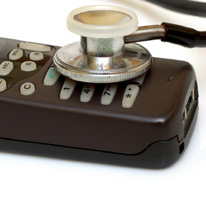Health Diagnostics
SIEF is supporting Health Diagnostics: Improving disease diagnosis in developing countries using mobile devices

Improving disease
diagnosis using mobile devices.
The challenge
Many diseases common in the developing world are treatable if properly diagnosed. Tragically, health workers in these countries often do not have access to modern disease diagnostic methods. This is not surprising, as virtually all of the advances in new diagnostic methods come from the developed world, addressing need of the developed world. Health Diagnostics is a proof-of-concept project to explore the use of mobile phones and inexpensive sensors as low-cost and robust health diagnostic tools for medical practitioners in the developing world.
The response
The team will diagnose disease by taking breath and urine samples of individuals who present to hospital with bacterial infection. The samples will be analysed using simple sensor arrays to produce a ‘fingerprint’ of metabolites which will then be tracked over time—changes are an indicator of the patient’s biochemical response to disease. The team selected these sensor technologies and human sampling methods because they are well-suited to mobile phone integration. They are robust, inexpensive, easy to distribute and can be deployed without the need for refrigeration, incubation or special consumables. The diagnostic system developed will take account of cultural issues, integrate well with the way doctors and health workers operate, and provide a level of diagnostic discrimination appropriate for, and commensurate with, the treatment options available.
The collaboration
The Health Diagnostic Research Project is a collaboration between CSIRO, scientists from Nossal Institute for Global Health (University of Melbourne) and Mahidol-Oxford Tropical Medicine Research Unit (Thailand). The collaboration integrates multidisciplinary expertise in sensor development, data analysis, engineering mobile phone add-ons, microbiology and clinical testing in the developing world.
Projected impact
Development of an integrated system for collecting and analysing samples and identifying diagnostic ‘fingerprints’ will lead to a point-of-care diagnostic device with the attributes necessary for widespread deployment in low resource settings: robustness, ease of use, integration into locally relevant medical decision support protocols, and, most importantly, affordability. Early diagnosis and appropriate treatment can make a huge difference to clinical outcomes. The development and provision of appropriate diagnostics which can be practically deployed in the developing world has the potential to save hundreds of thousands of lives.
